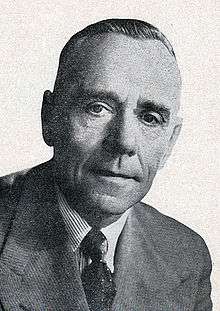Eric Louw
| Eric Hendrik Louw | |
|---|---|
 | |
| Minister of Foreign Affairs | |
|
In office 1955–1964 | |
| Prime Minister |
J. G. Strijdom H.F. Verwoerd |
| Preceded by | J. G. Strijdom |
| Succeeded by | Hilgard Muller |
| Minister of Finance | |
|
In office 1954–1956 | |
| Prime Minister | J. G. Strijdom |
| Personal details | |
| Born |
21 November 1890 Jacobsdal, Orange Free State |
| Died |
24 June 1968 (aged 77) Cape Town, South Africa |
| Political party | National Party |
| Alma mater | Rhodes University |
| Occupation | Lawyer |
Eric Hendrik Louw (1890–1968) was a South African diplomat and politician. Although a controversial and often undiplomatic figure, he was respected by admirers and critics for his unflinching courage and brilliant wit.[1] The outspoken High Commissioner to South Africa, John Maud, however characterized him in a dispatch as an embittered, spiteful, pedantic, vain, dreary and self-righteous neurotic, not unlike Joseph Goebbels.[2]
Early life
He was born in Jacobsdal in the Orange Free State on 21 November 1890 and died in Cape Town on 24 June 1968. He obtained a Bachelor of Arts degree at the then Victoria College, Stellenbosch. He went on to qualify as an advocate at Rhodes University College; Grahamstown, where he also practised.
In 1915, when his father died at Beaufort West, he took over the business interests.
Politician and diplomat
In 1924 he was elected Member of Parliament for Beaufort West, and the following year became South Africa's first Trade Commissioner in the USA and Canada. In 1929 he became High Commissioner in London and a year later South Africa's first envoy in the United States. After he had represented his country in Italy, France and Portugal and had been South Africa's first representative to the League of Nations, he returned to South Africa for political reasons. In 1938 he was again elected Member of Parliament for Beaufort West. During the Second World War he was, like most of his party, pro-Nazi. When the National Party won the general election in 1948, he was an obvious choice for the cabinet, firstly as Minister of Economic Affairs, then, from 1955, as Minister of Finance and from 1957 as Minister of Foreign Affairs. He was best known as South Africa's representative at UNO, Commonwealth and other overseas conferences. Between 1948 and 1962 he represented South Africa at UNO on eight occasions. As Minister of Foreign Affairs he assisted Dr HF Verwoerd at the historic Commonwealth conference in London in 1961 when South Africa withdrew her membership. On 31 December 1963 he relinquished his post as Minister of Foreign Affairs.
Honours and awards
He was awarded an honorary doctorate by the University of Pretoria in 1962. He was similarly honoured by the University of the Orange Free State in 1963. In 1965 a bronze bust of him by Hennie Potgieter was unveiled at Beaufort West in a school which bore his name until it was amalgamated with Niko Brummer Primary School in 1994. A high school in the town of Musina in Limpopo also bears his name.[3]
References
- ↑ Potgieter D.J., Standard Encyclopaedia of Southern Africa, Nasionale Opvoedkundige Uitgewery Ltd, Cape Town, 1971
- ↑ Hyam, Ronald (2010). Understanding the British Empire. Cambridge: Cambridge University Press. p. 353. ISBN 9780521115223.
- ↑ Hoërskool Eric Louw Musina Limpopo province
| Government offices | ||
|---|---|---|
| Preceded by Nicolaas Havenga |
Minister of Finance 1954–1956 |
Succeeded by Jozua François Naudé |
| Preceded by J. G. Strijdom as Prime Minister |
Minister of Foreign Affairs 1955–1964 |
Succeeded by Hilgard Muller |